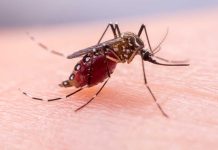
(DailyDig.com) – The Center for Disease Control (CDC) states that certain species of sandflies in the United States are spreading a parasitic flesh-eating illness that previously only affected individuals who had traveled to subtropical or tropical regions.
The incidence of the disease is highest in several Brazilian, African, and Mediterranean areas. Leishmaniasis is spread when a female sand fly bites someone. Sand flies feed on human blood to create eggs.
According to Vita Cama, a CDC scientist, it is widely believed that going abroad is associated with contracting any kind of leishmaniasis. While examining the types of samples being sent in, they discovered one subset of clients who did not mention having been abroad.
The parasite may also infest other animals, such as rats, and spread via sandflies. Although Leishmania parasites cause leishmaniasis infections, the disease’s manifestations may take several forms. The most prevalent kind, cutaneous leishmaniasis, may leave scars and ulcers behind for good. In its worst form, the condition may be lethal.
According to Cama, a study conducted by the CDC revealed that virtually all cases of leishmaniasis in individuals who had not traveled overseas were caused by the same type of leishmania.
From 2007 through 2022, there were a total of 117 confirmed cases in Texas, 38 of which were acquired locally. Although most cases have been recorded along the Mexico-Texas border, three cases acquired locally have been documented since 2007 in Travis County. If a patient presents with chronic symptoms and hasn’t recently been overseas, clinicians in Texas ought to investigate leishmaniasis as a possible diagnosis.
Cama believes the CDC is discovering more instances in Texas than in other states because of their superior case reporting infrastructure. It is unclear how common leishmaniasis really is in the United States until other states improve their reporting methods.
The DSHS recommends taking the same precautions you would take against any insect-borne illness, such as using insect repellent or covering exposed skin while outside.
Copyright 2023, DailyDig.com













